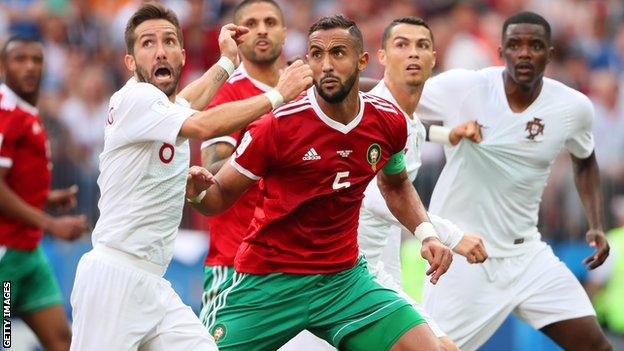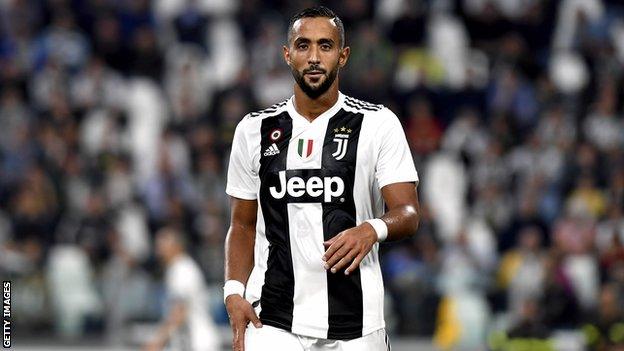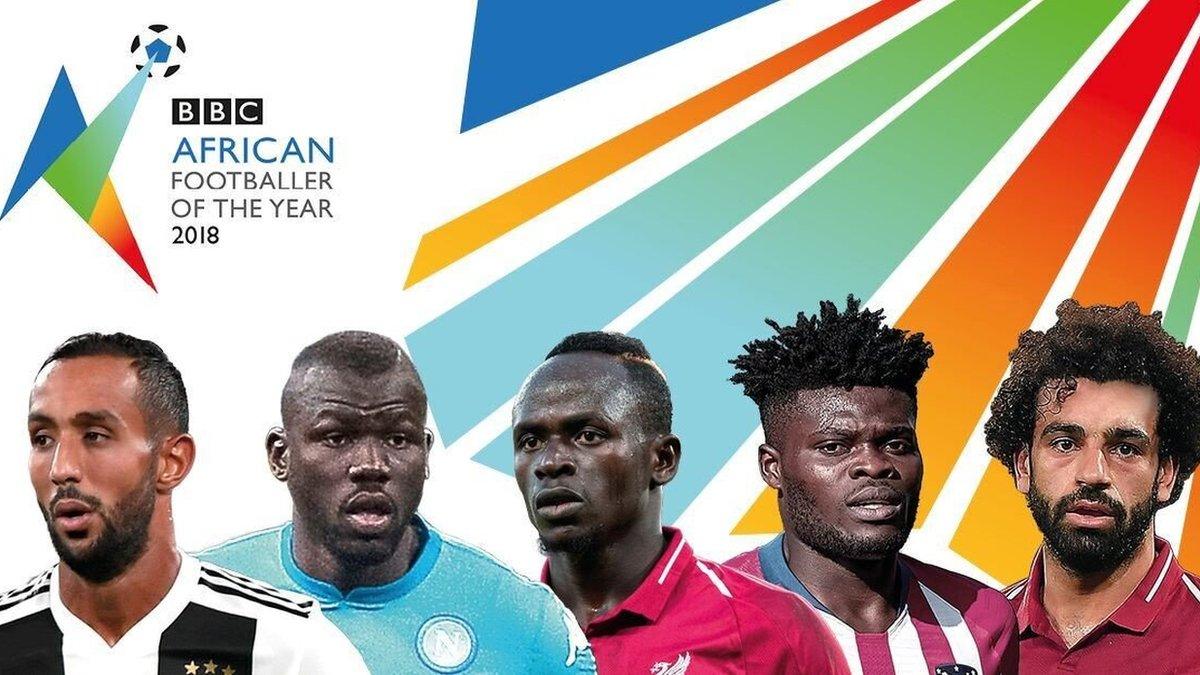Juventus' Medhi Benatia: Moroccan was expelled by France's top academy but still made it to top
- Published
Watch: Medhi Benatia's ruthlessly determined goal for Juventus against Roma
This week BBC Sport will be profiling the five players on the shortlist for BBC African Footballer of the Year. Next up is Medhi Benatia, the Juventus and Morocco defender. Details of how to vote further down this page.
When Medhi Benatia retired from international football in March 2017, few could have predicted the year that would follow.
Low on both form and playing time at Juventus, it was a point of principle that prompted the defender's absence from Morocco.
"I am not a cheat," the 31-year-old told BBC Sport. "Someone who is not playing at their club cannot be in shape to represent his national team."
While such a stance may be rare, it's even rarer when the player in question happens to be the national captain.
"The national team is about calling up the best players at the time," the centre-back said.
"I cannot say that because I am called Medhi Benatia and have a career behind me that I'm going to play 90 minutes when I lack rhythm. This is not beneficial for me, my coach or my team."
As he freely admitted in his resignation statement, he was not getting much playing time at Juve, where the famed three of Andrea Barzagli, Leonardo Bonucci and Giorgio Chiellini stood in his way.
Loathe to deny another Moroccan a chance when he was not as "competitive as he wished", Benatia said he would return when he was playing regularly for his club.
Voting details
Vote closes on 2 December at 20:00 GMT.
The final results will be announced in Focus on Africa on World News and World Service Radio on 14 December, starting at 17:30 GMT.
If you are viewing this page on the BBC News app please click here to vote., external
"Medhi is more than one player in my squad because I have a lot of respect for him," Morocco coach Herve Renard tells BBC Sport.
"There is one particular thing about Medhi - whether you like him or not, he is always straight. He thinks he has to tell you. I like a man like that. He's very honest and this is the most important."
In September 2017, having played far more regularly for Juventus, Benatia was back for his country.
Two months later came one of his greatest triumphs as Morocco reached their first World Cup since 1998 without conceding a goal in a group containing 2015 African champions Ivory Coast, Pierre-Emerick Aubameyang's Gabon and Mali.
In addition, they sealed qualification when winning 2-0 in Ivory Coast - with captain Benatia scoring the all-important second goal.
"He is a real leader both on and off the pitch because of his experience," says Frenchman Renard.
"When you are playing at this level, it is because you are a big competitor - especially if you're a defender. He's a very intelligent player, able to anticipate and technically very good.
"He is also passionate about football, which is very important for a coach. Before a game, he is always asking about the profile of the striker. He is very curious, very professional."
Yet it wasn't always thus.
Expelled from Clairefontaine
The national training centre of Clairefontaine in France is understandably famous around the world - having produced Thierry Henry, Nicolas Anelka and Kylian Mbappe, among others, while helping deliver two World Cup wins since it opened in 1988.
Very few who are selected for the elite academy fail to last the course and even fewer go on to make it as a professional.
But Benatia is one of those - having struggled with its academic rigour.
"We were supposed to do three years, but I only did two," he admitted. "At the time, I had big troubles in the school. I did not want to do any school work, I also had some behavioural problems. I was - in inverted commas - a complete idiot."
His turbulence in the classroom led to his expulsion from Clairefontaine and while he has no issue with the decision - calling it "fair" - he also remembers it being "like an electric shock".
"Honestly, it was bizarre to go home and see my mother and father who were really very angry with me," recalls a man born near Paris to a Moroccan dad and an Algerian mum.
"They said: 'You have wasted a great opportunity for you to do something with your life so today you must accept the consequences.' They were really very sad for me.
"I realised then I was on the way to losing everything, and that my dream of being a footballer might slip away if I continued along that path. It was because of that I changed. I had to redeem myself."

Benatia was part of a Morocco side which played well at the World Cup in Russia, despite finishing bottom of a tough group that featured Portugal, Spain and Iran, with just one point from three games
And how.
For, despite numerous challenges during his career - "it would take quite a lot of time to run through the list", Benatia rebounded so hard he made it to the very top.
His first break after Clairefontaine was when offered youth terms at Guingamp, where he spent a year before signing for Marseille.
Once again, what appeared a dream move turned into a nightmare.
"They put so many obstacles in my way," he said. "They did everything so that I could not play with the professional group, which was unfair because the youth coaches were all unanimous in saying I deserved to.
"But there were people in higher positions who thought differently. That was a big regret because Marseille was a very important club for me. I had it deep in my heart to wear the jersey, but they blocked me."
He never played for Marseille (not even when a strike meant the club fielded a reserve side at PSG in 2006),, external and his mettle was further tested when a torn knee ligament suffered during a loan spell at Lorient kept the then 20-year-old out for a year.
"All those things forged my character and gave me a real fury to succeed, a hunger to reach my goals and, thanks to God, that is what happened. I have done more perhaps than I imagined."

When Benatia left Marseille in 2008, he dropped down to Clermont Foot in the French second division - rebuilding his career so successfully that Udinese came calling in 2010.
His three-year spell there was hugely successful as the Italians finished fourth, third and fifth while recording their three highest-ever Serie A points tallies. They have not qualified for the Champions League nor finished higher than 13th since Benatia left in 2013.
The next stop was Roma, where he duly helped another side achieve a then-record points total, as they finished second, and a best-ever clean sheets record (21).
Keen to stay, Benatia was sold instead to Pep Guardiola's Bayern Munich, where his run of four consecutive league titles began - the first two coming with the Germans, the second pair with Juventus.
His brief Morocco retirement came during his first season in Turin, having moved there in 2016 (initially on loan).
Eighteen months on, Benatia has not just added two more league titles but two Italian Cups - having scored twice in a 4-0 thumping of Milan in May's final - as well as a Champions League runners-up medal.
With a maiden World Cup appearance as well, it is a remarkable turnaround for a player for whom adversity has been a familiar foe.
"It's true that it's been a route full of obstacles, twists and turns with lots of tests," he explained.
"Some take a motorway and always drive straight while others get lost along the way, take the wrong path and come back - but the most important is to reach your destination. I managed to arrive where I am dreamed of being, so I am happy and proud about that."
But there is one more dream to fulfil - helping the country he did not want to "deceive" last year win only its second Africa Cup of Nations title (and first since 1976).
"If I had the chance to win this cup, this would be a unique moment engraved in our minds," he said.
"Just speaking about it gives me goosebumps. It sounds so incredible already but we're not there yet. If we don't win with a coach like [two-time winner] Herve Renard, we will never win, so we have to believe - and do everything to win it."
- Published2 December 2018
